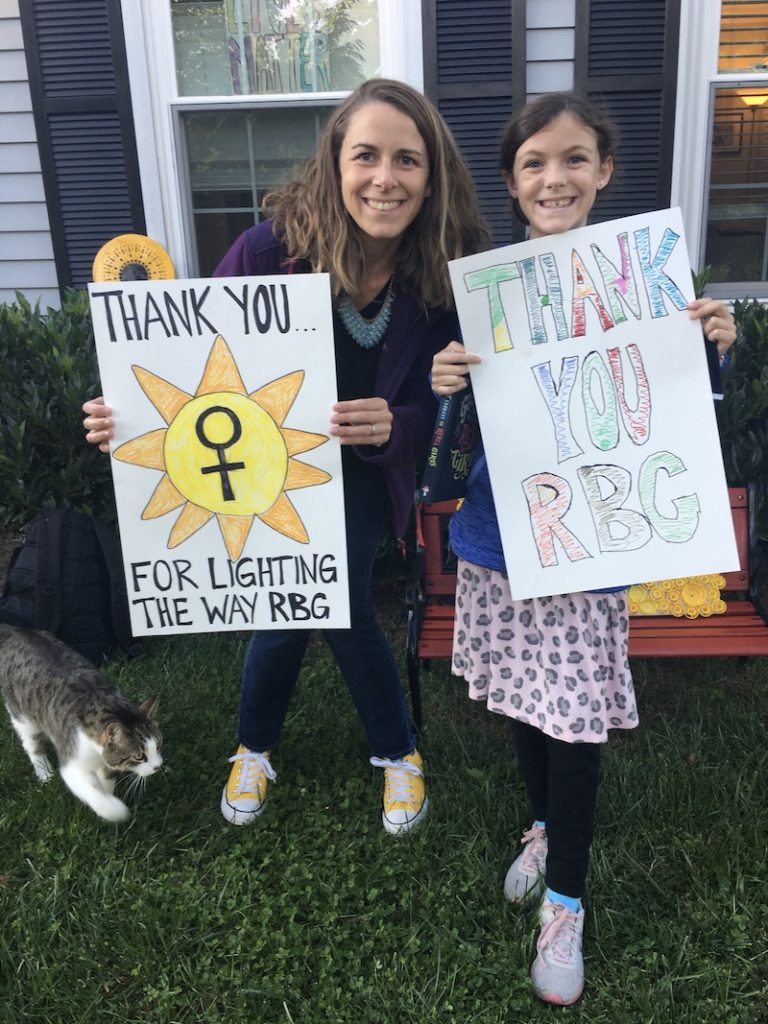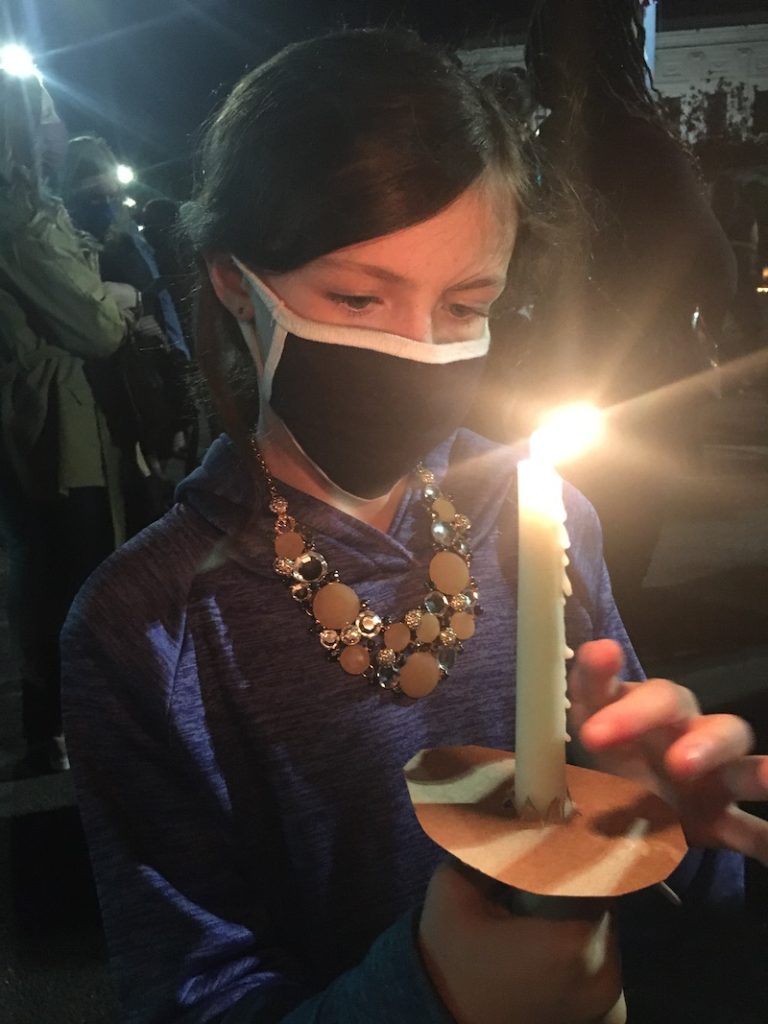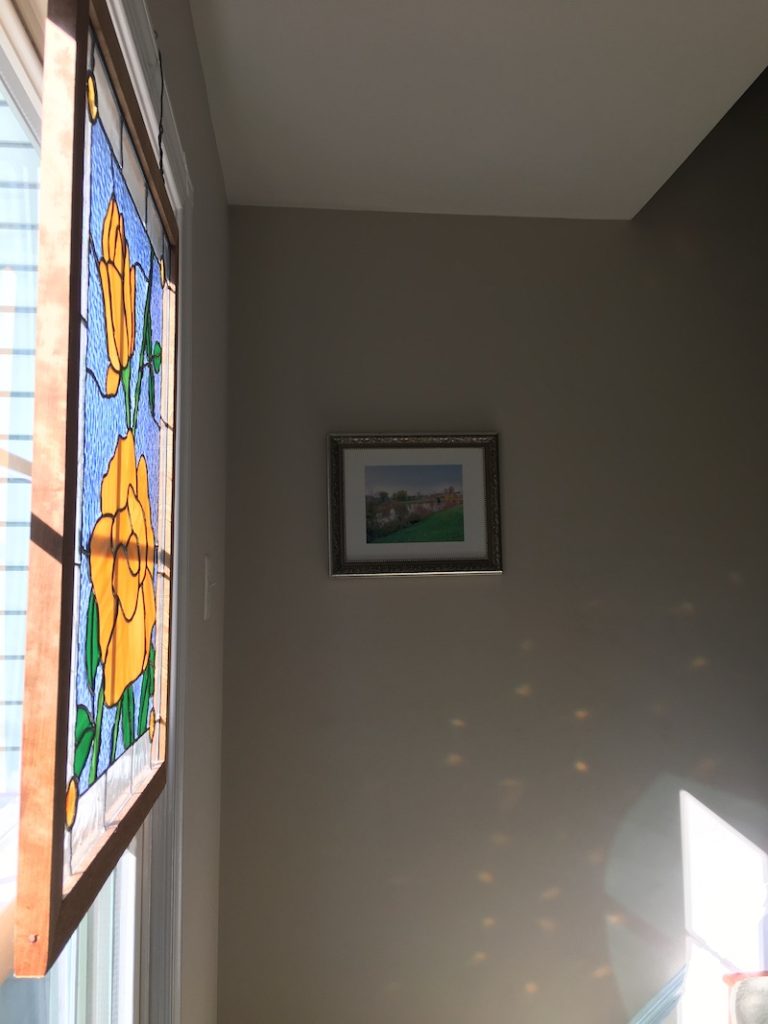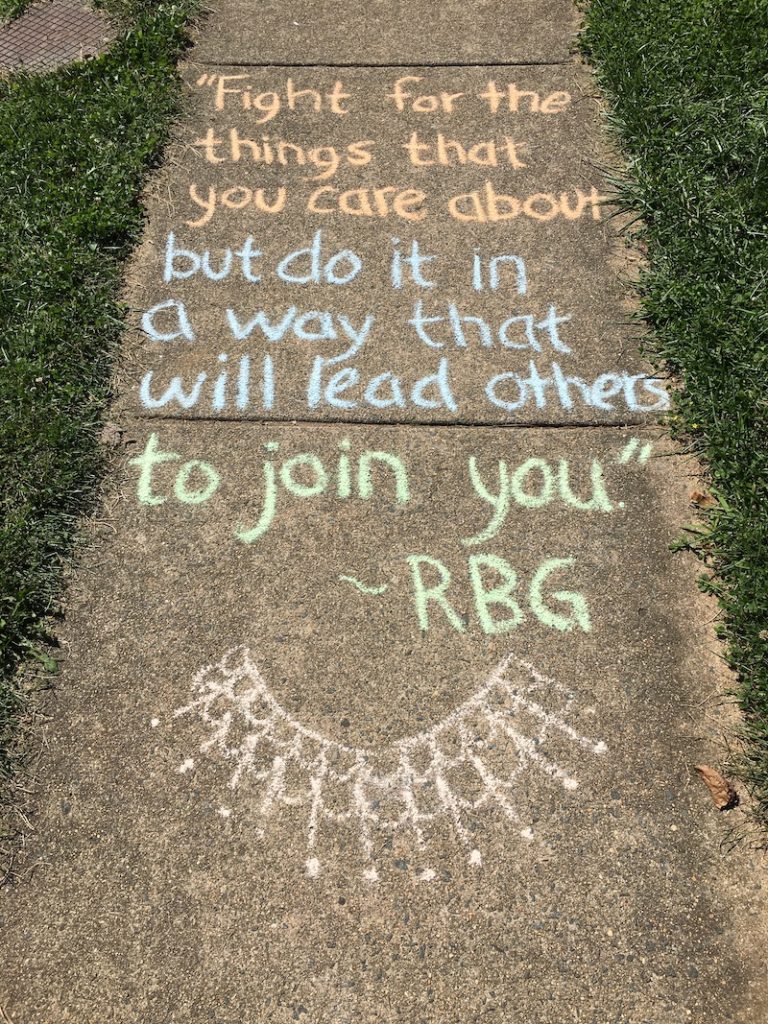
Last night Lily and I drove to Washington, D.C. with candles and signs in tow for a vigil honoring Ruth Bader Ginsburg on the steps of the Supreme Court. We wore fancy necklaces as a nod to Ginsburg’s iconic collars.
The news of her death Friday wasn’t surprising, necessarily. I knew she had been ill over the past year. And if 2020 and Calvin & Hobbes have taught me anything, it’s that things are never so bad that they can’t get worse.
Saturday morning I saw that there would be a vigil and I felt called to go. Not because I am a political junkie or an expert on the Supreme Court or even, like, an obsessed RBG fangirl (I never dressed any of my children or myself as her for Halloween- though I think Annie would make an especially cute RBG…). But because I admire that she was a pioneer- a women who consistently carved a space for herself in institutions dominated by men. I admire her dedication to equality. And I didn’t want to continue feeling as if it’s inevitable that our country get swallowed by waves of hate and intolerance. So I went to find solace and solidarity.
I spent the day reading about Ginsburg and her work and what she stood for and I found this quote:
“When I’m sometimes asked ‘When will there be enough (women on the Supreme Court)?’ and my answer is: ‘When there are nine.’ People are shocked. But there’d been nine men, and nobody’s ever raised a question about that.”
What amuses and saddens me about my initial reaction to these words was that I was shocked, too. Nine female justices?! Impossible! Would that even be fair? What does that say about how entrenched I am in the dogma and the patriarchy in front of me? That I couldn’t fathom nine women on the Supreme Court all at once? I mean, we can all agree that’s kind of messed up, right?
I did some quick Googling about the makeup of the Supreme Court.
One hundred fourteen justices have served on the Supreme Court since it was established in 1789. Of those, 108 have been white men. Two have been black men. Four have been women. (source: CNN)
Four.
It was at this point that I think I more fully understood the magnitude of RBG’s accomplishments and the magnitude of her loss. It was never acceptable for her to be the anomaly. She wanted and fought for equality. And she wanted and fought for that that equality be the norm, not the exception.
And for that she was exceptional.
In thinking about what RBG stood for, I recalled a quote from the documentary “Crip Camp,” about a summer camp for teens with disabilities run by a “bunch of hippies” and the fight for the Americans with Disabilities Act.
In it, disability rights activist Judith Heumann is engaged in yet another battle for equal access for herself and other people with disabilities and she says wearily and near tears, “I’m very tired of being thankful for accessible toilets. If I have to feel thankful about an accessible bathroom, when am I ever gonna be equal in the community?”
That idea- that a person should owe a debt of gratitude for basic human dignity- I think that is at the root of so much discord right now.
I feel what Heumann says, not because I have a disability. But as a woman.
People with disabilities should not be made to feel indebted because there are wheelchair accessible bathrooms. Not when many struggle to find jobs that would enable them to lead independent lives. Not when they face bias and discrimination from people who refuse to see their humanity before their disability. Not when accessibility is still a problem in schools and workplaces and other public spaces. Not when they are denied affordable health care.
Women should not be made to feel indebted because we were given the right to vote 100 years ago (133 years after the Constitution was signed). Not when we, on average, make 82 cents for every dollar a man make (even less for women of color). Not when we are routinely harassed and assaulted in workplaces, schools, public spaces and even our own homes. Not when male politicians want to police the choices we make about our own bodies. Not when we fail to be equally represented in spaces decisions are made
Black people should not feel indebted because 56 years ago legislation passed that prohibited discrimination in public spaces and institutions and protected their right to vote (a right that had already been granted to black men by the passing of the 15th amendment in 1869). Not when their ancestors were dragged to this country against their will and endured almost 250 years of slavery. Not when they endured lynchings and segregation and discrimination for another 100 years after they were freed. Not when they are murdered with impunity by police. Not when decades of housing discrimination through red lining has denied them high-quality schools and the opportunity to amass wealth. Not when their right to vote is still threatened by Voter ID laws and limited access to polling stations. Not when laws that deny ex-felons the right to vote (even after they’ve paid their debt to society) disenfranchise them. Laws that disproportionately affect black men because black men are disproportionately represented in our country’s prisons.
Poor people should not feel indebted because of food assistance and welfare programs. Not when companies put profits ahead of people and move quality jobs overseas. Not when they have to work multiple minimum wage jobs to in order to sustain their families. Not when those same minimum wage jobs limit the hours a person can work at them in order to avoid having to provide health care benefits. Not when the cost of a college education has exploded, making the degrees that lead to better-paying jobs unaffordable. Not when predatory lending keeps them in an endless cycle of indebtedness.
Women like Ruth Bader Ginsburg and Judith Heumann and the activists Lily and I listened to speak last night aren’t demanding that all these marginalized groups be treated better than everyone else, but that they be treated equally.
That they be given basic human dignity.
Life, liberty and the pursuit of happiness.

Lily and I went downtown last night to light a candle for Ruth Bader Ginsburg, this beacon of humanity and equality. This force of a woman. I went to be among people who were both mourning her passing, but also intent on guarding the delicate flame of our democracy.
It was moving to see the court surrounded by bouquets of flowers, votive candles, chalk messages, signs and stones left in her memory. It was inspiring to be among the hundreds and hundreds of people, with signs and candles and voices celebrating RBG and rededicating themselves to their roles as citizens. Looking around at these faces of all colors, young and old, I was reminded that this is our country. OUR country. That it only gets pirated and taken off course when we allow it to through ignorance and apathy. Fear and hate.
There might not be a long list of things that all 328 million-plus Americans agree on. But I feel as if we’d all concur that 2020 has been a difficult year. And that when it comes down to the very root of the root of what would make our time here fulfilling, it’s those values written into the Declaration of Independence. Life. Liberty. Happiness.
Walking up the stairs in my house yesterday, I smiled. The prisms in the stained glass piece that hangs in our front window was throwing rainbows on the wall. My dad made the panel when I was a kid and passed it on to me a few years ago. A pair of yellow roses against a pale blue background with round beveled glass in the corners. When the sun hits the glass at the right angle, round rainbows speckle the stairway. It’s magical.

The stained glass and the candles at the vigil and the fact that Ruth Bader Ginsburg was such a beacon for justice and equality have me thinking about light. How light guides us during dark hours. How when it’s divided into its components, the result is beautiful and inspiring.
The division we’re witnessing in our country right now does not feel beautiful or inspiring. It feels dangerous and scary and insurmountable.
But at the vigil, I looked around and saw all these different faces and backgrounds. People with different beliefs and experiences. I look around my neighborhood and see the same. And on my Facebook feed and at school. Even in my immediate family and my extended family. We all bring different ideas and dreams to the table. We all bring our own stories.
We’re all these points of light who can lend our hearts and voices and our energy toward the creation of something beautiful and inspiring. A country that shines brightly and fully because of all of its component pieces. A country that belongs to all of us.
The prism of our democracy celebrates our differences. It filters the light each of us carries and celebrates its diversity. It showcases each color equally.
Lily and I left the vigil when our candles burned out. But thanks to the memory of RBG and the camaraderie of the men and women and children around me, the fire within me, within Lily, within everyone who showed up, was stoked.
We won’t let democracy die in darkness.
Side note: thank you to the fellow vigil goer who helped me narrowly avoid setting my hair on fire while I stooped down to pet her must adorable puppy.

